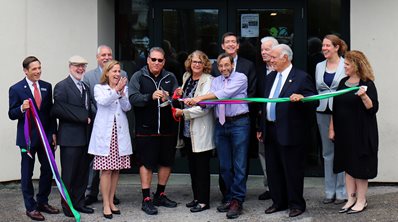The Manchester Recovery and Treatment Center, the Queen City’s innovative and collaborative approach to addressing substance misuse, celebrated an open house Thursday afternoon with staff, dignitaries, and donors in attendance.

“The Manchester Recovery and Treatment Center is a prime example of what can be accomplished when private organizations, community leaders, public officials and individuals work together toward a common goal and vision,” said Manchester Mayor Joyce Craig. “By having multiple resources available in one place, we are able to lower the barriers for individuals seeking care.”
The Manchester Recovery and Treatment Center is one building that houses four critical services offering complete, wrap around care to help individuals find and sustain recovery: Hope for NH Recovery, Families in Transition-New Horizons, the Mental Health Center of Greater Manchester’s Mobile Crisis Response Team, and Catholic Medical Center’s Wilson Street Integrated Health.
“This first-of-its-kind facility is just what our community needs to help address the rise in substance use and mental health disorders,” said Maureen Beauregard, President, Families in Transition-New Horizons. “Our Willows Substance Use Treatment Center and Recovery Housing has grown exponentially physically and operationally in this new space. In fact, in the first six months of this year, we’ve provided substance use treatment to over 250 people and provided recovery housing to 76.”
Guests at Thursday’s open house were able to tour each of the four facilities. The Manchester Recovery and Treatment Center is located in the former Hoitt Furniture building, at the corner of Wilson and Valley Streets in Manchester. The site provides easy access for clients and close proximity to other community partners.
Hope for New Hampshire is a peer-based recovery center, offering support to all pathways to recovery (12-Step, SMART, Dharma, Health Realization, etc.). Each member of Hope’s staff is in recovery from substance use disorder and offers members empathy and shared experience on the road to fuller and happier lives. In addition to support meetings, Hope offers a dynamic visual arts program, ear acupuncture, cranial massage, and a safe and sober place to meet. Hope is on the first floor of the Manchester Recovery and Treatment Center and was the first occupant.
Families in Transition-New Horizons owns the second and third floors of the building where they house their Willows Substance Use Treatment Center and Recovery Housing. The second floor offers co-occurring treatment for men and women in need of substance use and mental health services, as well as recovery housing for women and their children. The third floor offers recovery housing for single women. Each program focuses on breaking down barriers so that each individual can get the treatment and services they need.
The Mental Health Center of Greater Manchester’s Mobile Crisis Response Team (MCRT) occupies the fourth floor. The Mobile Crisis Response Team is a 24/7 service accessible to children and adults experiencing a psychiatric or substance misuse crisis. These clinicians and certified peers provide both telephone and in person risk assessment and evaluation, as well as access to skills and resources, in an effort to avoid hospitalization. MCRT, which provides outreach to individuals and families in home and community settings, is available for the crisis needs of those seeking services in the building. The program also houses four 4 crisis beds at the Manchester Recovery and Treatment Center, reserved for adults 18 and older who may need a short term non-hospital stay for crisis stabilization.
Wilson Street Integrated Health, also located on the first floor, is a service of the Health Care for the Homeless Program of Manchester, a collaboration between CMC and the Manchester Health Department. The practice, which opened last month, offers primary care, social work, counseling and medication assisted treatment to those who receive other services at the Center, as well as clients in the area. The clinic is available for those needing immediate care, as well as ongoing attention to help sustain their recovery and wellness.
The Manchester Recovery and Treatment Center was made possible with the collaboration and support of public officials, private donors, and community and recovery leaders, many of whom were in attendance at the open house.